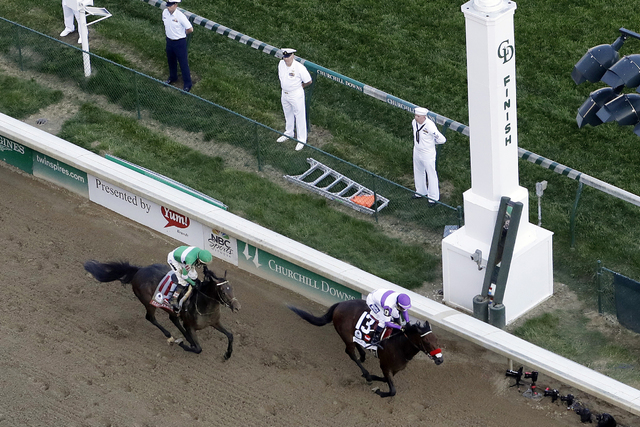Front-runner? Dark horse? Is this horse racing or politics?

I always found it fascinating that the verbiage in politics refers quite often to horse racing. I was reminded of that again Thursday while watching the presidential debate coverage.
There long has been a parallel between horses competing in a race and politicians running for office.
For example, a “front-runner” is a horse that takes the early lead. Ted Cruz was a front-runner among the Republicans, but he “faded in the stretch” and was passed by Donald Trump.
A “dark horse” refers to a long shot who has a better than average chance to outrun his odds. Bernie Sanders started as a dark horse for the Democrats, made a strong run, then conceded late to Hillary Clinton.
Clinton was a big “favorite” at the start and has maintained her position. Despite a spirited campaign with Trump, she remains “odds on” favorite to win the presidential election. Trump is a “long shot,” so if he wins, it would be a major “upset.”
The vice presidential nominee is called a “running mate.” In horse racing, that can mean part of a coupled entry or even if the horses race uncoupled but have the same owner. Tim Kaine and Mike Pence are the two running mates in this election.
Those that finish “out of the money” are horses that did not “hit the board,” meaning finishing first, second or third. However, in politics, the payoff is for win only. So, for example, the Republicans began the primaries with 17 candidates, meaning 16 of them ran out of the money.
With election night Nov. 8, there are various horse racing metaphors to describe these final weeks. Clinton and Trump are “neck and neck” as they are “nearing the wire.” They are in the “home stretch,” or as famed track announcer Dave Johnson used to say, “and down the stretch they come.”
If the voting turns out close, then the candidates are in a “photo finish” that might be “too close to call.”
And finally, because Trump said in Wednesday’s debate that he might not accept the final results of the election, there could be an “inquiry” or an “objection.” In horse racing, those are adjudicated by a three-person panel of stewards.
In politics, there are legal procedures in each state should there be an election inquiry.
Bottom line, these metaphors show that horse racing is a part of our mindset and many people don’t even know it.
GENTLEMAN JIM McKAY
It is common practice nowadays for a racetrack to schedule a series of rich stakes races for their state-bred horses. But someone had to hatch the idea first.
That someone was Jim McKay, the late Hall of Fame broadcaster for ABC Sports. He created the Maryland Million Day, which is this weekend at Laurel Park, to bolster the horse racing industry in his native state.
If I made a list of the five most compelling things I have done in my horse racing career, one would be working for ABC Sports and having the opportunity to meet Jim McKay. Words cannot adequately describe what a true gentleman he was.
Richard Eng’s horse racing column is published Friday in the Las Vegas Review-Journal. You can buy his Santa Anita picks at racedaylasvegas.com. Contact him at rich_eng@hotmail.com and follow @richeng4propick on Twitter.